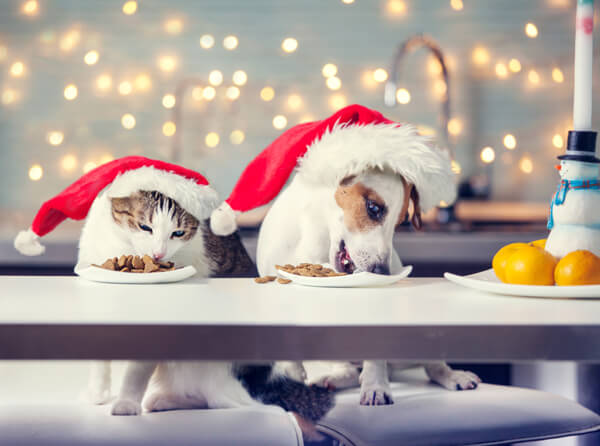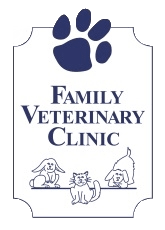|
Holiday Foods to Avoid Feeding Pets
Holidays season brings about great food for your family and your pets. There is no shortage of treats, rich foods, and relatives around the house. While it is embedded in pet owners not to give chocolate to dogs, there are some surprising foods that can also be just as harmful, if not more. Here is a list of holiday foods to avoid feeding pets.

Rich, Fatty Foods
These foods can be hard for your pet to digest. Turkey skin, chicken skin, and gravy have a very high-fat content. After ingesting them, your pet may experience vomiting or diarrhea. Rich, fatty foods in your pet’s diet can result in inflaming their pancreas, a vital part of their digestive system.
Bones
As bones cook, they lose their moisture and become brittle. You may think it natural to feed your dog a bone, but all cooked bones should be avoided. Bones can splinter and become lodged in your pet’s throat or digestive system, causing serious injury. We recommend talking with us about the type of raw bones that are safe for your pets.
Onions and Garlic
All members of the onion family or closely related (shallots, garlic, scallions, etc.) contain components that can damage red blood cells in cats and dogs. Eating only a small amount can cause gastrointestinal irritation. There is some debate on appropriate levels of garlic in your pet’s diet. If you are unsure or have questions, please contact us.
Chocolate
We all know chocolate is bad but do you know why? Chocolate contains caffeine and other components that are toxic to dogs and cats. Even though this is a well-known fact, it is still one of the most common causes of dog poisoning. If your dog has ingested chocolate, they can vomit or have diarrhea, but they may have arrhythmias or seizures which can be serious. When in doubt, contact your veterinarian.
Alcoholic Beverages
This seems like common sense, and while you may not be giving your dog alcohol, drinks are often left unattended at gatherings. Holiday drinks tend to be sweet, and curious pets could end up gulping down your eggnog. Also, holidays food can often contain alcohol. Make sure not to leave the rum-soaked fruitcake out.
Raisins/Grapes
While chocolate and alcohol might not be a surprise, often raisins and grapes aren’t known for being poisonous to your animals. They can cause kidney failure in dogs. The initial signs of poisoning are vomiting and hyperactivity. Make sure to keep all desserts, fruitcakes, fruit baskets out of the reach of your pet at all times. If you suspect your pet has eaten grapes or raisins, contact your vet as soon as possible.
Nuts
Not all nuts are created equal. Some nuts, like peanuts, cashews and hazelnuts are good nuts for your pets. (Just make sure cashews are cooked or roasted.) Other nuts, like almonds, walnuts, macadamia nuts, pecans, pistachios and hickory nuts are not good for your pet. There are varying reasons from minor upset stomachs to severe reactions. To stay on the safe side, stick to peanut butter.
Milk Products
We know the picture of a cute kitten drinking a saucer of milk rings a bell. Unfortunately, it isn’t that cute. Dogs and cats aren’t built like us to break down lactose and, as a result, ingestion can lead to digestive issues. This includes all dairy products. Mostly this will cause acute intestinal distress.
Yeasty Doughs
Bread?!? Yes. Your pet’s stomach is the perfect environment for bread to rise. So, if your dog accidentally eats unbaked dinner rolls, they will expand in their stomach and cause excessive bloating. Large amounts may even cause rupturing. Also, the unbaked dough is fermented, which results in alcohol being absorbed, which we already know is not good for them.
Now, you may have known all of these and are particularly versed in what your pet should or should not eat, but don’t assume everyone does. The holiday is about gathering with friends and family. Let them know to avoid feeding your pets table scraps or too many treats.
If you have any questions, Family Veterinary Clinic is here to help. If you suspect your pet has eaten something toxic, contact us immediately. The sooner you seek medical attention, the more options your vet will have for treating your pet.
|







